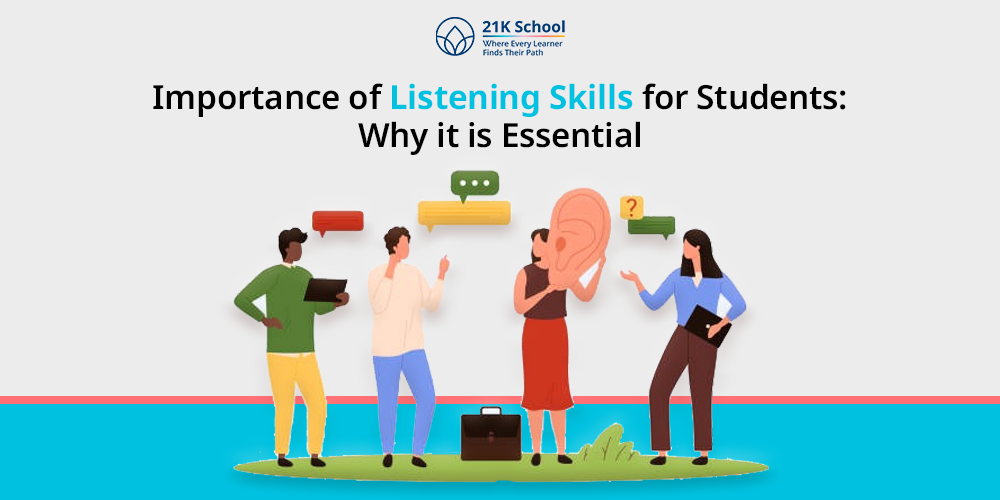
Listening skills are linked with communication skills but listening doesn’t mean to hear sounds, instead it is a process of interpreting messages accurately.
Listening skills are considered as important soft skills, which completes the communication process. Effective communication is related to communication skills which allows students to indulge in a collaborative learning environment.
Through listening skills children are better able to develop empathy and understanding as well as improve mental retention. Listening skills allow children to have a proper understanding without any jargon.
Table of Contents
- What Are Listening Skills in Educational Context?
- Importance of Listening Skills for Students – Top 12 Reasons
- 1. Enhance Communication and Social Skills
- 2. Improves Critical Thinking Skills
- 3. Improves Academic Performance
- 4. Inculcates Emotional Intelligence
- 5. May Boost Confidence
- 6. Can Contribute to Improved Mental Health
- 7. Improves Linguistic Barriers and Vocabulary Expansion
- 8. Prepares for Career
- 9. Improved Problem Solving
- 10. Enhanced Focus and Attention to Details
- 11. Helps in Digital Age Navigation
- 12. Sets Cultural Awareness and Global Perspective
- Importance of Listening Skills for Students- Age-wise Importance
- Importance of Listening Skills for Students With Special Needs
- Future of Listening Skills for Students in Digital Age
- Ending Note
What Are Listening Skills in Educational Context?
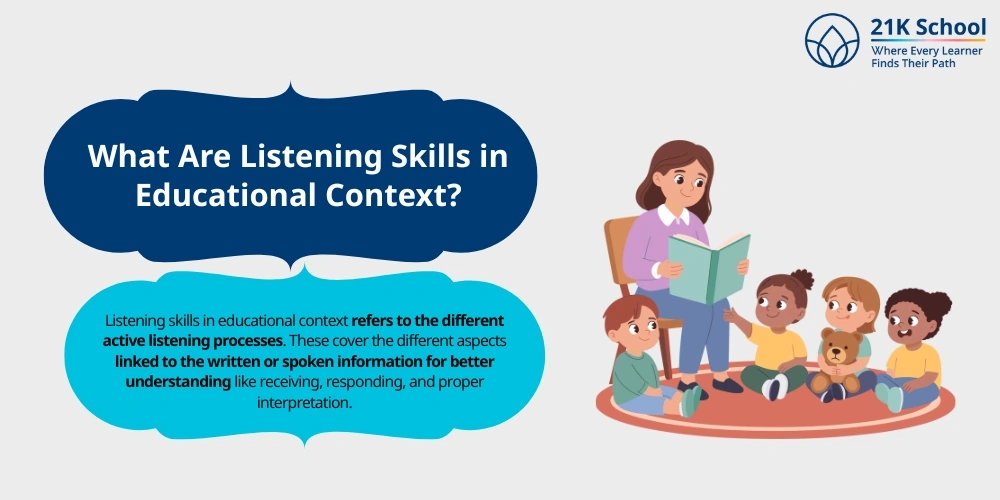
Listening skills in educational context refers to the different active listening processes. These cover the different aspects linked to the written or spoken information for better understanding like receiving, responding, and proper interpretation.
Hence, these skills covers critical listening and active listening. The key aspects of listening skills in education makes it important beyond the simple hearing skills.
Importance of Listening Skills for Students – Top 12 Reasons
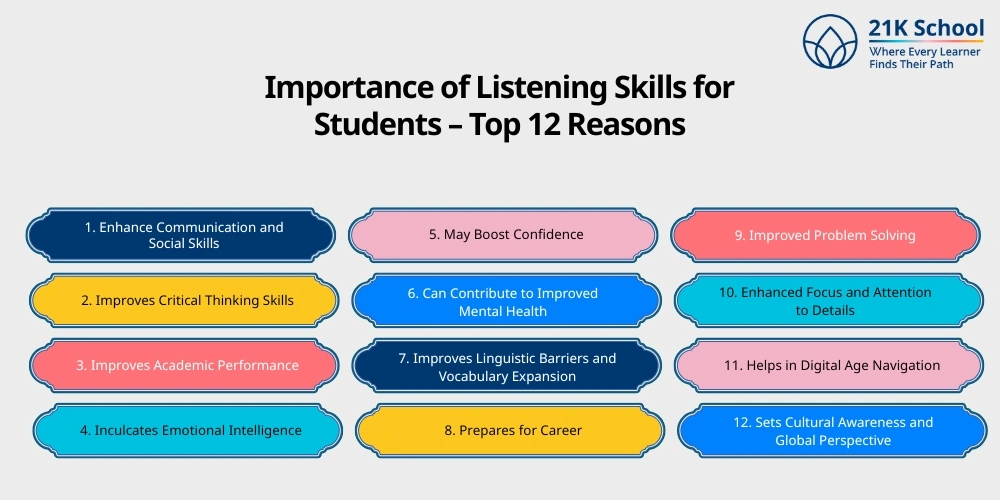
Listening skills play an important role in developing prior relationships with others. Through listening skills children are better able to interpret any information more actively and resolve conflicts. Here you can check the importance of listening skills mentioned below.
1. Enhance Communication and Social Skills
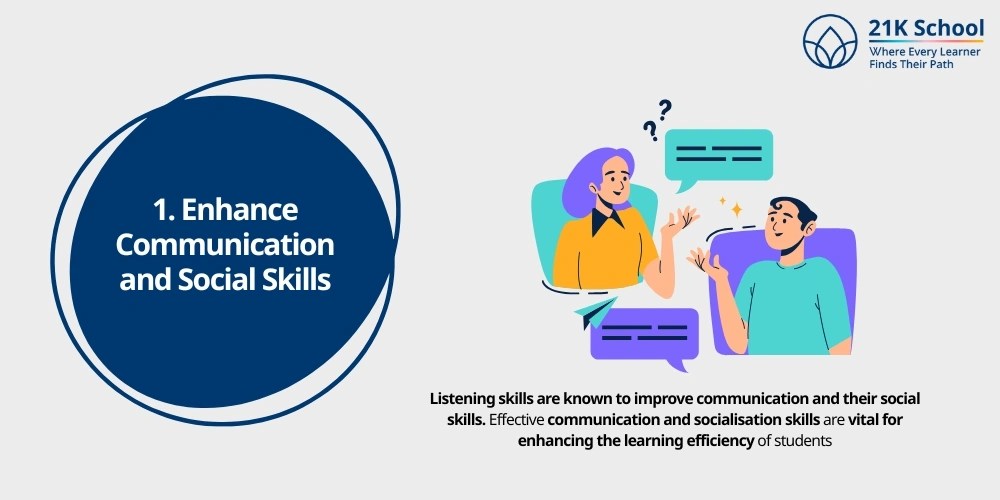
Listening skills are known to improve communication and their social skills. Effective communication and socialisation skills are vital for enhancing the learning efficiency of students
Listening skills are all about understanding and retention information accurately for a longer period of time.
Listening skills also allow students to develop social skills making it easier for them to focus on socialisation. Through which students are better able to make relationships and develop a positive learning environment.
2. Improves Critical Thinking Skills
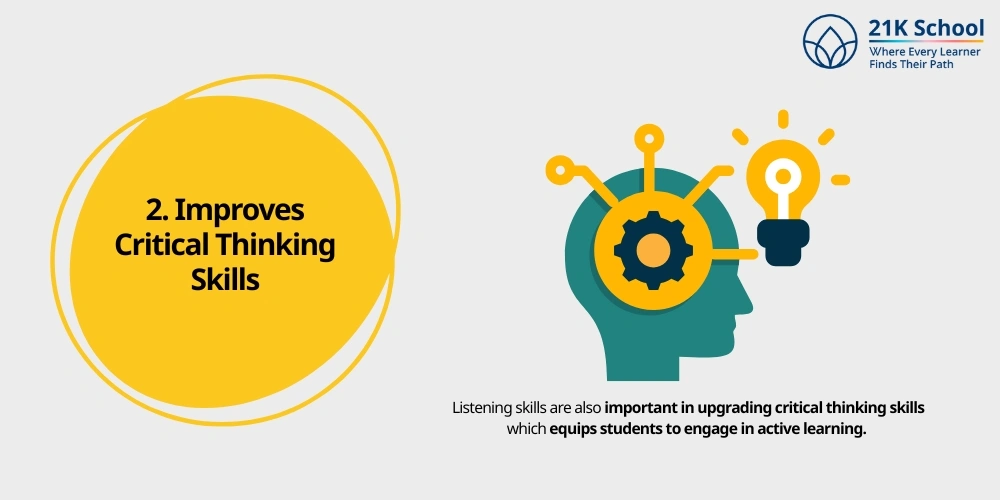
Listening skills are also important in upgrading critical thinking skills which equips students to engage in active learning. The ability to listen, therefore, enables children to be more capable of analysing and interpreting information more accurately.
Through critical thinking skills children are better able to understand complex concepts. Listening skills improve critical thinking skills as it allows students to indulge in effective communication through active listening.
3. Improves Academic Performance
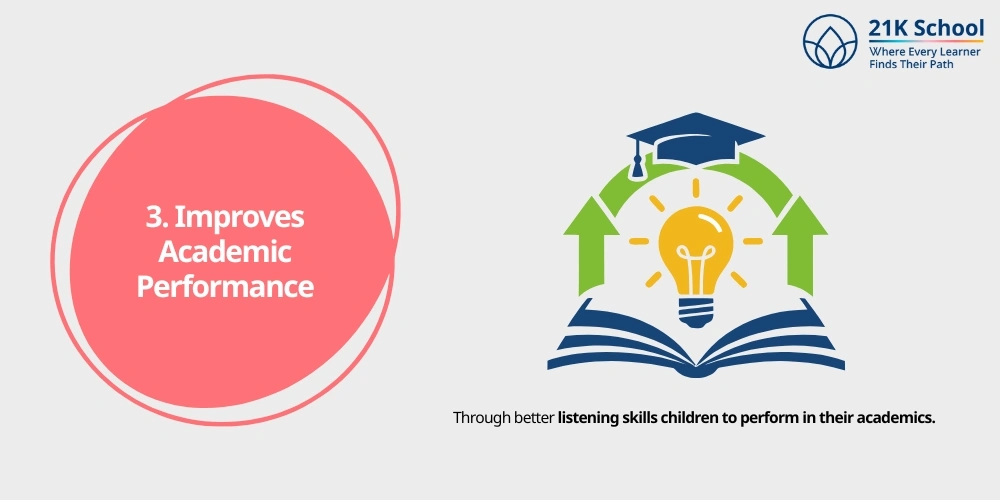
Through better listening skills children to perform in their academics. Through active listening skills children are better able to return information for a longer period of time which allows them to comprehend knowledge without any hindrances.
This allows children to perform better in their examination which also reduces their exam stress.
4. Inculcates Emotional Intelligence
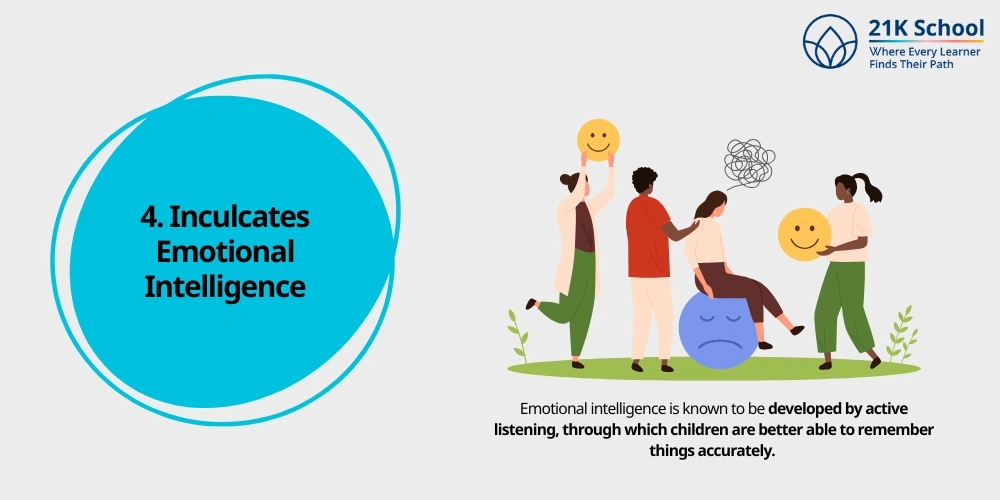
Emotional intelligence is known to be developed by active listening, through which children are better able to remember things accurately. Through this children can effectively memorise concepts for a longer period of time.
Even active listening allows students to develop empathy and understanding which is known for emotional intelligence. Through proper emotional intelligence students can participate in activities and make relations with others.
5. May Boost Confidence
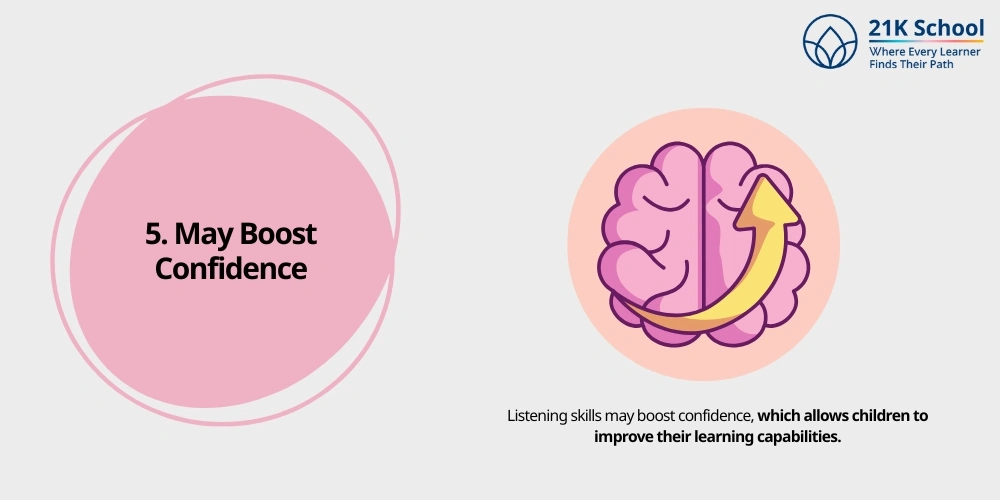
Listening skills may boost confidence, which allows children to improve their learning capabilities. Children with good communication skills are able to comprehend as well as to avoid misinterpretation.
Develops students’ confidence as well as listening skills, “engagement, or listening, ability allows students to better learn and perform academically”. With confidence, students find it easier to deal with their issues.
6. Can Contribute to Improved Mental Health
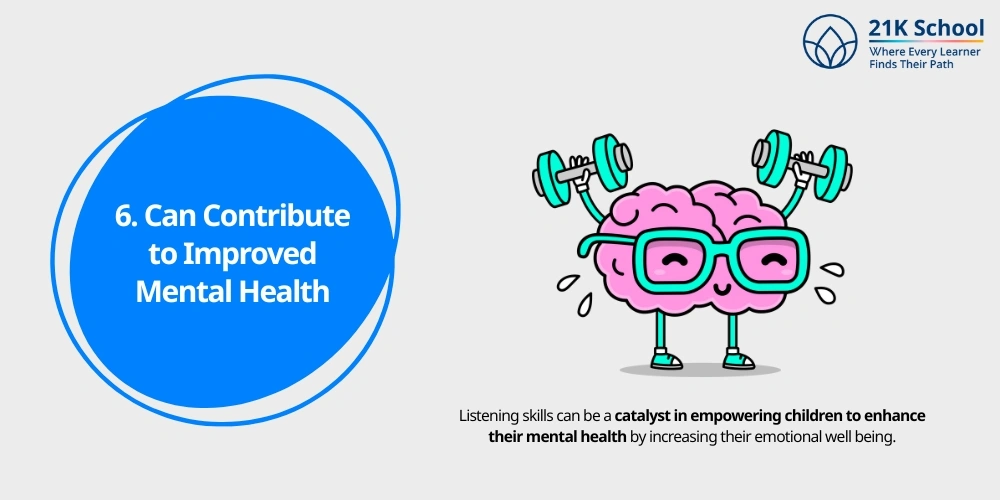
Listening skills can be a catalyst in empowering children to enhance their mental health by increasing their emotional well being.
This enables children to augment their mental capacity, which helps remembering things easier and for more time. With this students are able to obtain good scores in their exam and enhance their academic performance.
7. Improves Linguistic Barriers and Vocabulary Expansion
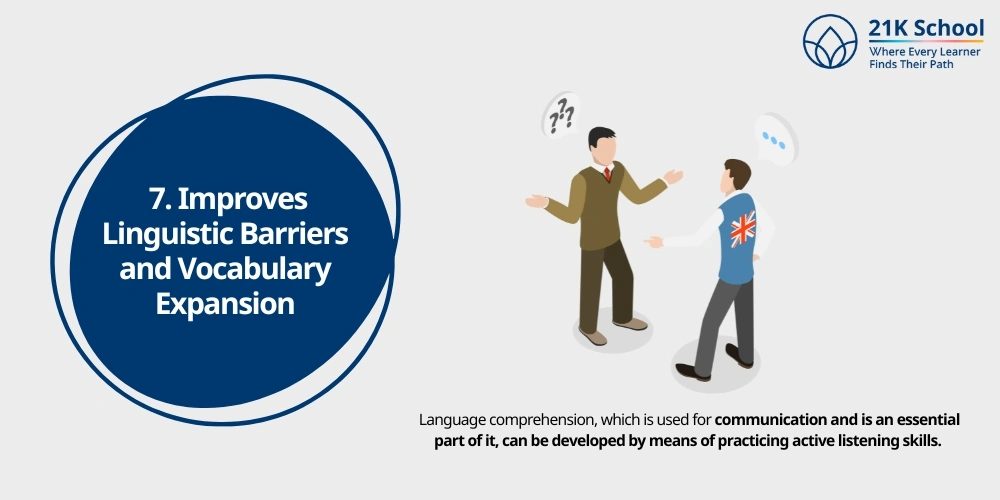
Listening skills also assist to develop the language and vocabulary by enhancing the relation between both. Language comprehension, which is used for communication and is an essential part of it, can be developed by means of practicing active listening skills.
Language hurdles interfere in the process of communication and establish barriers for both speakers and listening. Language is, among other things, a medium of communication, and thus to be proficient in language is to communicate smoothly and intuitively.
8. Prepares for Career

The listening skills along with the best and communication skills are key if a person wants to develop career opportunities.
This also allows children to effectively indulge in the interpretation of messages, which are vital skills in the workplace.
9. Improved Problem Solving
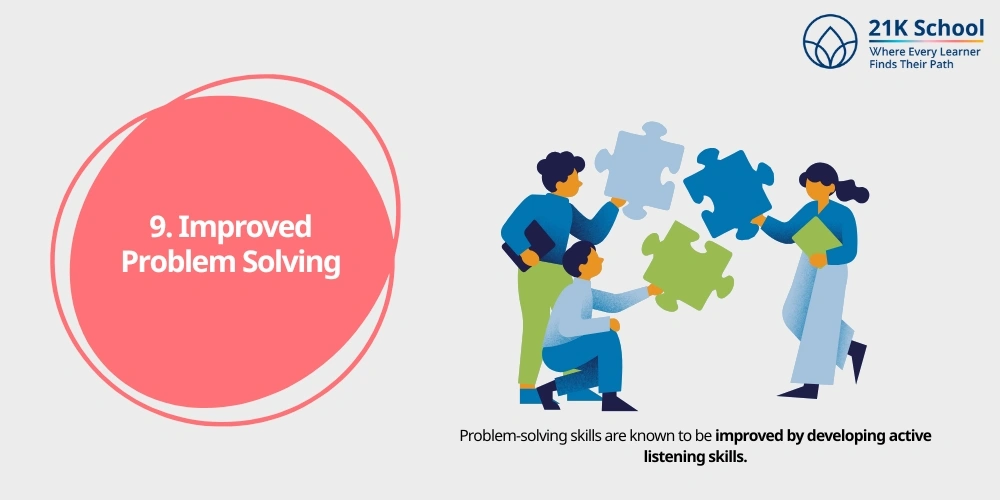
Problem-solving skills are known to be improved by developing active listening skills. Through listening students understand and interpret messages which require problem-solving.
This also allows students to develop curiosity through which they ask questions. Effective listening allows individuals to take problems as opportunities and make learning more impactful.
10. Enhanced Focus and Attention to Details
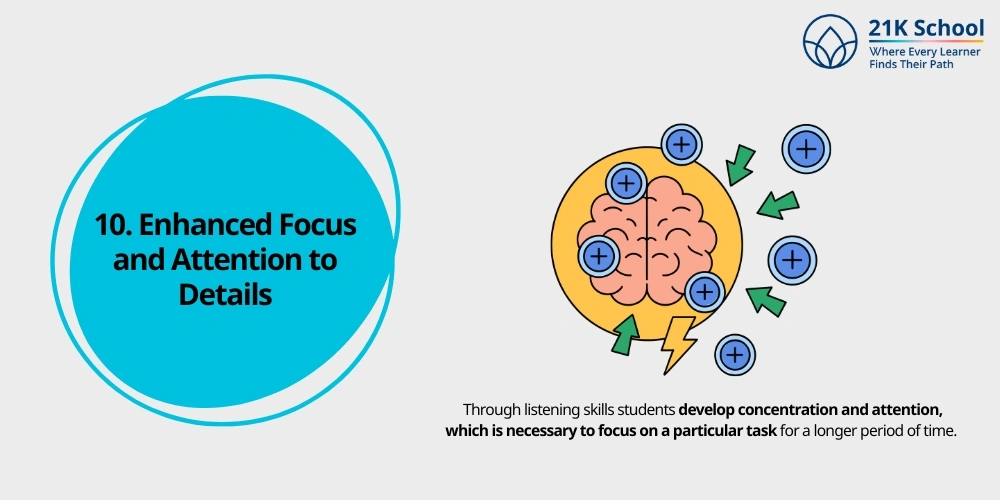
Through listening skills students develop concentration and attention, which is necessary to focus on a particular task for a longer period of time.
Listening skills allow students to see difficult problems as opportunities and create solutions from different perspectives.
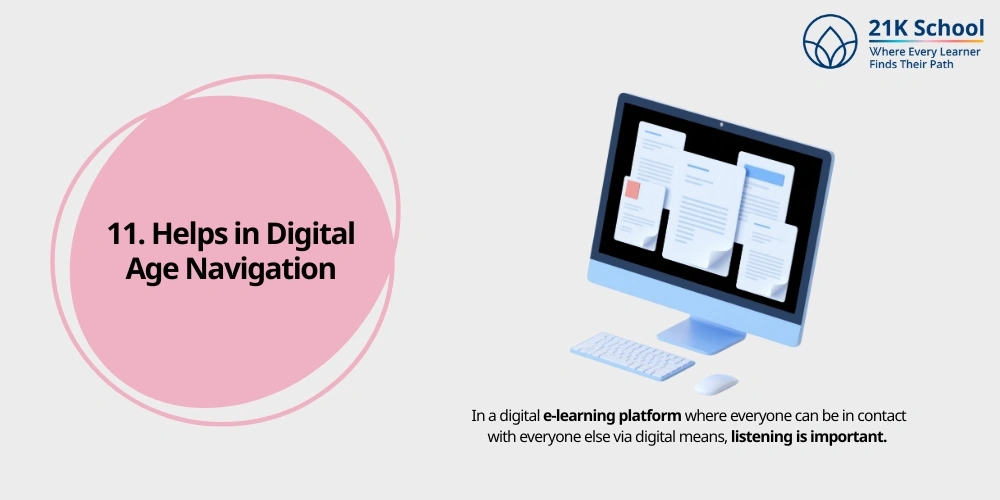
In a digital e-learning platform where everyone can be in contact with everyone else via digital means, listening is important. Another reason for the need of listening skills in online learning is the nature of communication in digital environments.
With the help of active listening students are better able to comprehend any information in the digital world, which also allows them to develop digital literacy skills.
12. Sets Cultural Awareness and Global Perspective
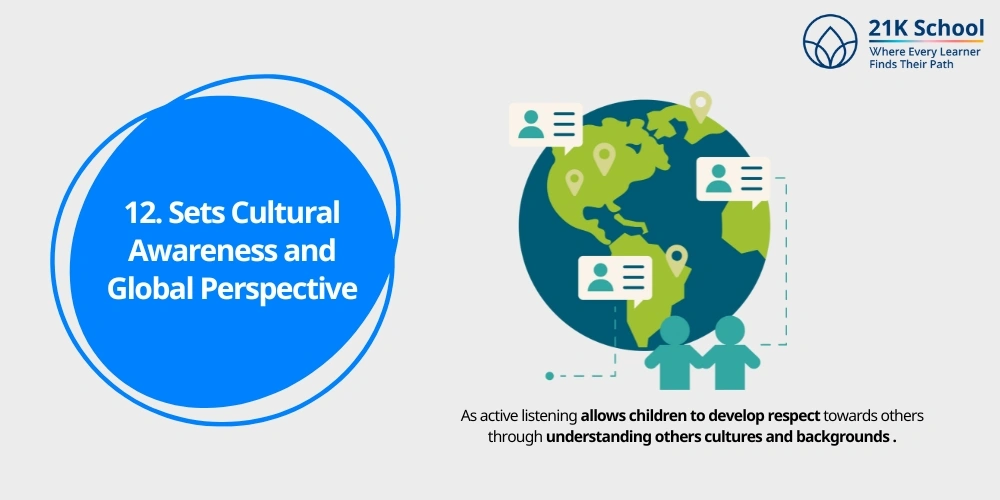
Listening skills help children to listen to others and actively synthesise the information. This allows them to focus on developing empathy and understanding through checking different perspectives, which allows them to develop cultural awareness.
As active listening allows children to develop respect towards others through understanding others cultures and backgrounds
Importance of Listening Skills for Students- Age-wise Importance
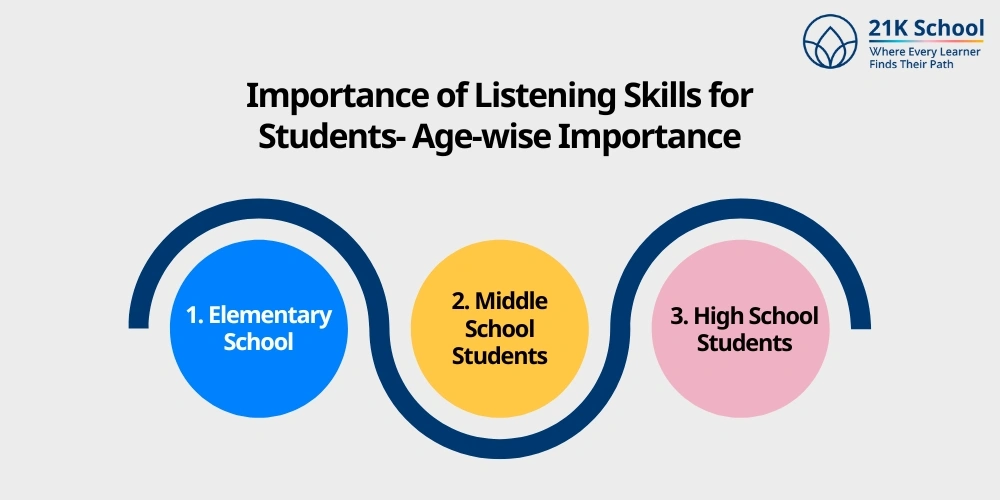
Listening skills are essential in every stage of learning. Developing listening skills at an early age allow children to perform better in the examinations as well as in professional settings.
Listening skills have three developmental stages known as elementary school age, middle school age, and high school age. The following are the reasons for the importance of listening for different age group students.
1. Elementary School
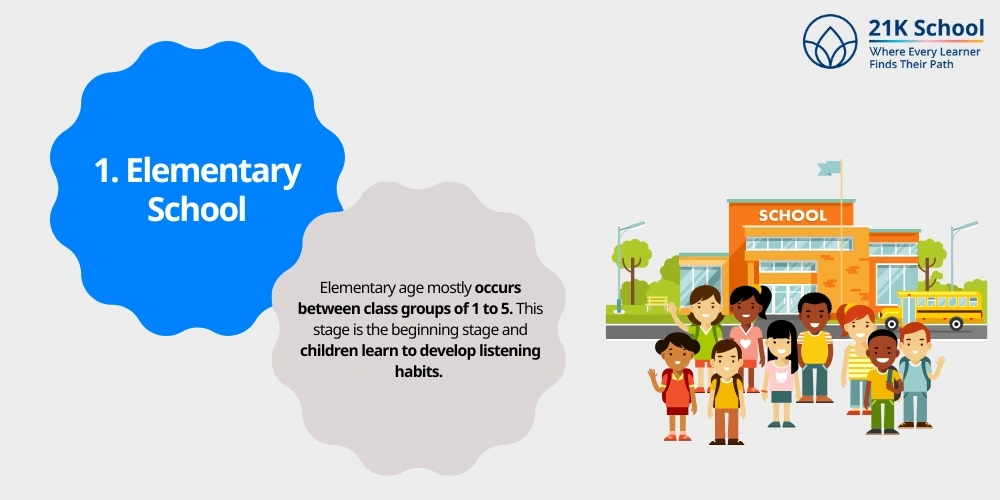
Elementary age mostly occurs between class groups of 1 to 5. This stage is the beginning stage and children learn to develop listening habits. Developing listening skills are essential at an early stage which not only help them academically but also helps them in their future career.
As at an early age children start to learn new concepts and develop language proficiency, having command over listening at an early period allows them to have proper communication skills.
2. Middle School Students
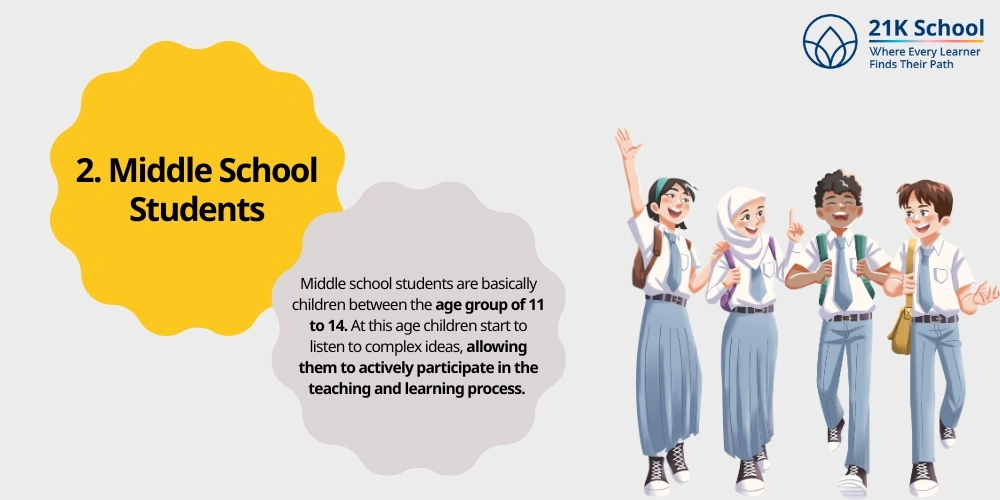
Middle school students are basically children between the age group of 11 to 14. At this age children start to listen to complex ideas, allowing them to actively participate in the teaching and learning process.
Through properly engaging in the listening activities students are better able to think critically and make proper interaction with peers and teachers. This also allows them to develop social interactions with others, which allows them to enhance their confidence.
3. High School Students
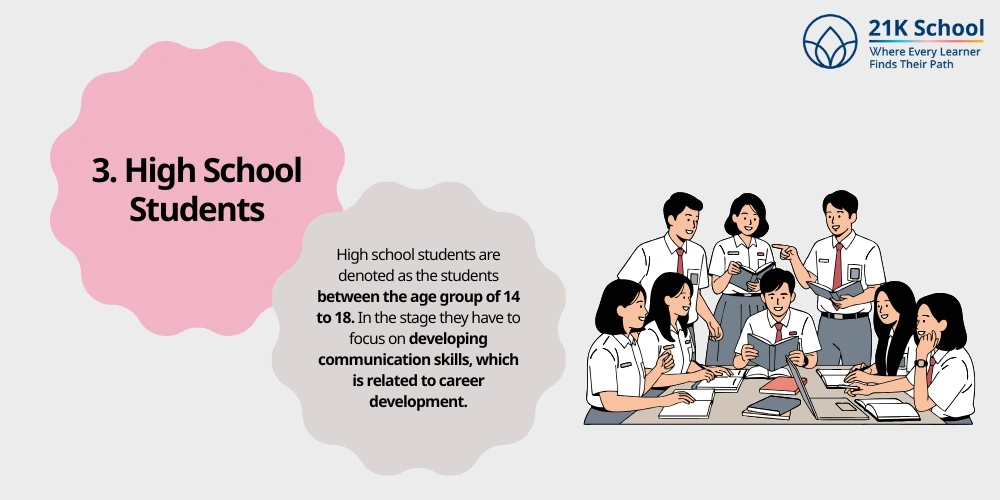
High school students are denoted as the students between the age group of 14 to 18. In this stage listening skills plays a vital role for their overall development as in the stage they have to focus on developing communication skills, which is related to career development.
Developing listening skills are vital to connect with others, which also showcases the quality of leadership among students.
Importance of Listening Skills for Students With Special Needs
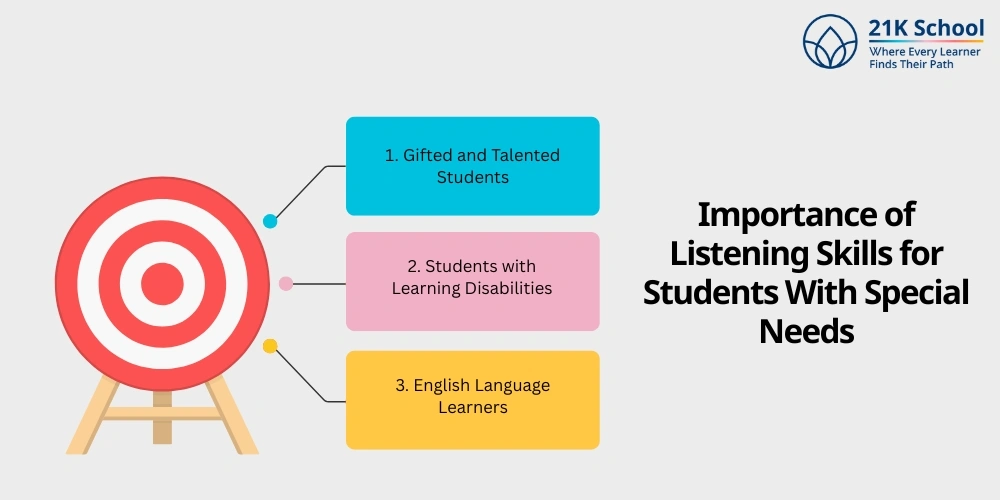
Listening skills are equally essential for special needs students or gifted children as effective and more accurate communicative skills.
It helps them listen better and thus understand the information more accurately or be able to process more of it. Also this is the reason listening skills are important for student with special needs.
1. Gifted and Talented Students
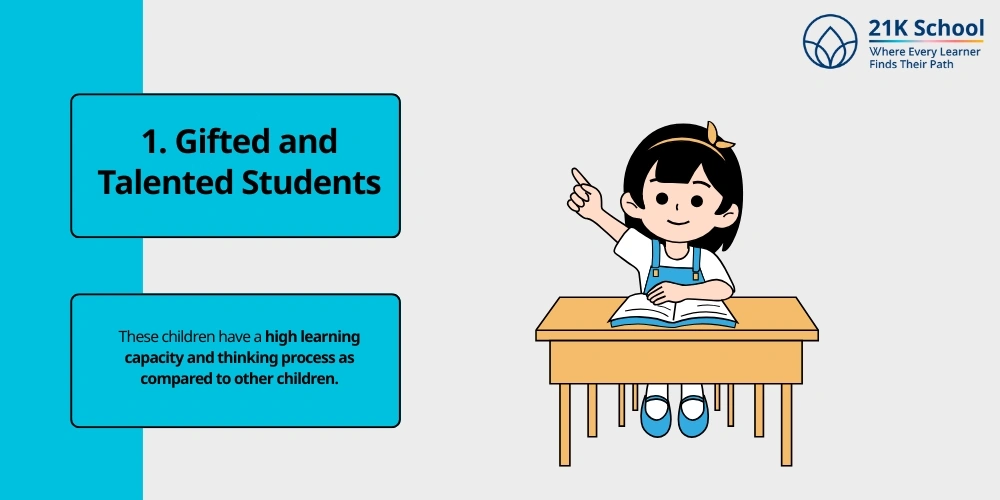
These children have a high learning capacity and thinking process as compared to other children. Listening skills are important for them because it allows them to actively analyse the difficulty of the concepts making it comprehendable for them.
Through listening these children can develop empathy and trust among others as well as allow them to become more understandable.
2. Students with Learning Disabilities
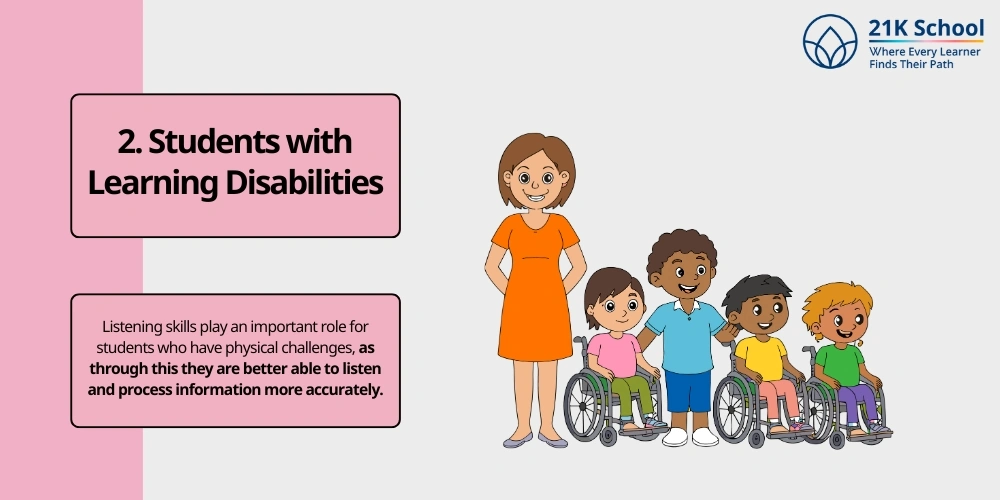
Listening skills play an important role for students who have physical challenges, as through this they are better able to listen and process information more accurately.
Also Effective listening skills boost their morale and interest towards others message through which they can connect with others. Through active listening skills they are better able to develop teacher-student relationships, which is essential for effective academic performance.
3. English Language Learners
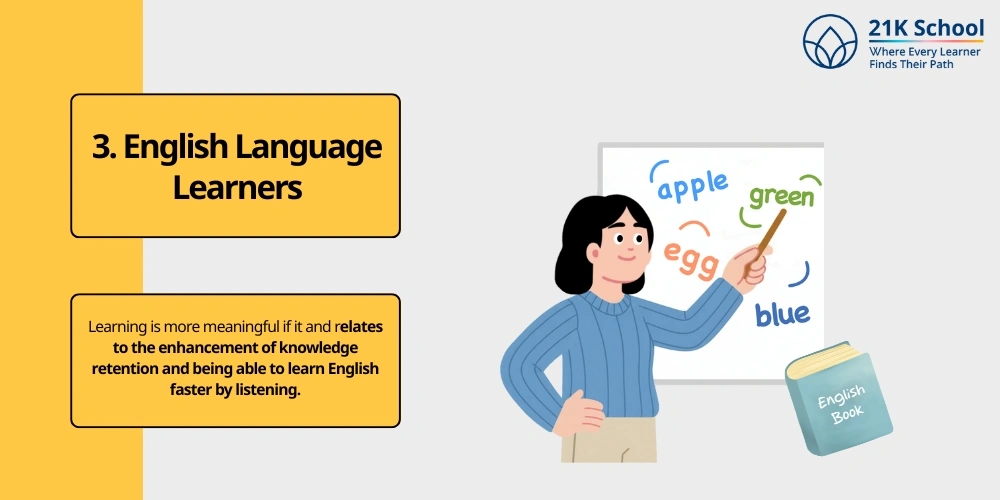
Learning is more meaningful if it and relates to the enhancement of knowledge retention and being able to learn English faster by listening. That is, by listening, children learn English efficiently and enhance vocabulary skills.
Children receive pronunciation, connotation, and verbal signals through listening. As listening is related to pronunciation, children who develop listening skills are better able to communicate with others.
Through this they develop confidence which is necessary in participating in class activities and developing problem-solving skills as well.
Future of Listening Skills for Students in Digital Age
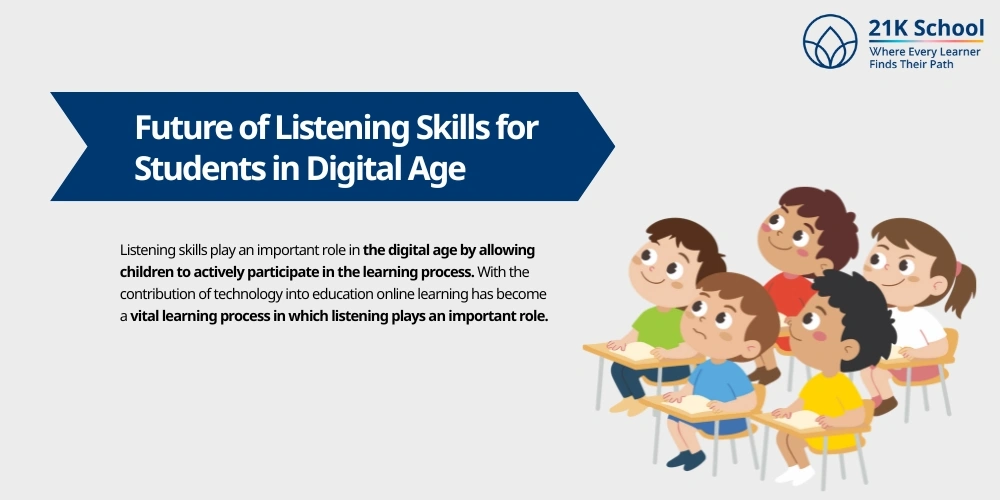
Listening skills play an important role in the digital age by allowing children to actively participate in the learning process. With the contribution of technology into education online learning has become a vital learning process in which listening plays an important role.
Through listening skills, children will grow creative thinking skills and it will help them grasp concepts with greater ease.
Good listening skills offer strong immersion and internalisation in socialisation with others and significant learning.
Ending Note
Active listening enables them to develop their communicative as well as their critical thinking skills.
The Internet and digital technologies have also become necessary tools of survival for today’s students in this age of operation and learning, as well as, communication and digital literacy.
For these students to be effectively included in the mainstream classroom, listening skills can be the means of greater participation and collaboration.
Strong listening skills training and equipping students with the resources are essential for both academic and professional success. As, well as prepare students for for holistic education.
